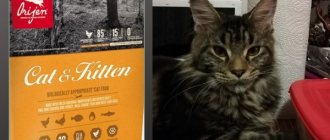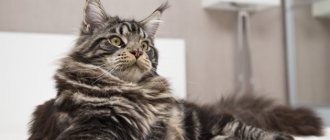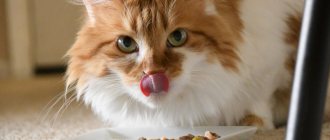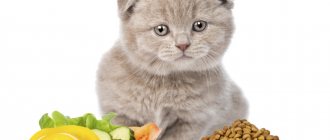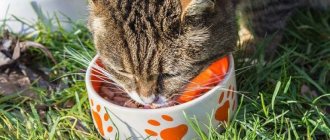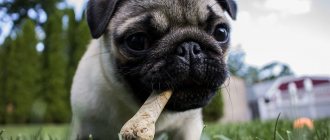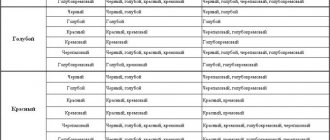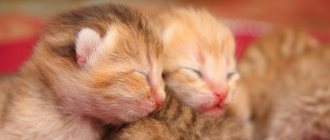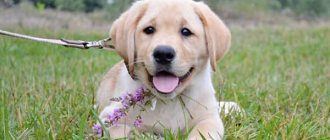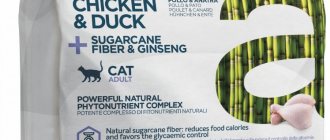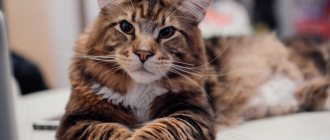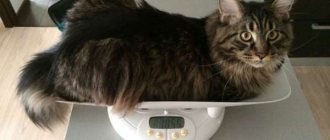The Maine Coon is very popular today. Its main differences from other breeds are its large size and weight. The main condition for the good appearance and health of your beloved pet is proper and balanced nutrition. Given the size of the pet, a special diet and regime is required that must be followed, so the question of what to feed the Maine Coon is very important for owners.
Natural nutrition.
Natural nutrition
The cat is a carnivore, so the bulk of its diet should be meat and meat products. It contains all the substances necessary for the animal’s body - vitamins, minerals, proteins. For coons, natural food is preferable as it is most suitable for them. This diet should include the following ingredients:
- meat (preferably raw);
- fish;
- various cereals;
- dairy products;
- milk;
- vegetables.
The last two components are a source of fiber and probiotics, which have a positive effect on the animal’s digestive tract. The table of required nutrition is shown below:
| Age, months | Number of feedings | Grammage |
| 1-1,5 | 6 times a day | 20-30 ml. |
| 1,5-2 | 6 times a day | 120-150 gr. |
| 3-6 | 4 times a day | 190-245 gr. |
| 6-9 | 3 times a day | 200-250 gr. |
| 10-12 | 2 times a day | 150-200 gr. |
Material on the topic: all about the character and habits of Maine Coons.
Meat and fish products
Meat must be included in the animal's diet.
Veterinarians consider poultry, rabbit, and beef to be the most appropriate. Raw beef is the most natural food for carnivores. It affects the increase in muscle mass of the body. To make it absolutely safe for your pet, it must first be frozen. Before giving it to the cat, it is defrosted and cut into small pieces. A kitten should be given no more than 30 grams, and an adult animal 100-150 grams per day. You cannot use sausages or sausages.
They contain a large amount of spices, as well as other substances harmful to cats. Eating this way can worsen his health. You can include offal - kidneys, liver and others. They can replace natural meat in terms of the content of essential substances. They are best used raw; do not cook them. and even more so fry. But you shouldn't use offal too often.
It is better not to overuse fish, but if fish is still chosen as food, it is better to choose varieties that do not contain bones. They can injure the esophagus and stomach, which can lead to very serious problems. You should not give smoked or salted fish, it will have a bad effect on the condition of the kidneys. For your cat, you can choose red varieties of fish several times a week, as they contain a lot of healthy fatty acids.
Fermented milk products
You should not use fermented milk products with a fat content of more than 9% for feeding, but low-fat ones should not be used either. It is not recommended to include fermented baked milk, sour cream, and sweet yoghurts in your diet. Do not use dairy products with a long shelf life. The preservatives they contain can have a detrimental effect on the health of the coon. The optimal solution is low-fat cheese (5-9%), kefir or yogurt. Milk can be given to small kittens; it is not suitable for adults.
Cereals and porridges
It is very good for coons to use sprouted wheat, oats, and barley. They contain vitamins. You can also prepare porridge based on these cereals with the addition of a large amount of meat. Such porridges can be a good diet for an animal.
Vegetables and fruits
Vegetables can be given in any form. The following vegetables are suitable for inclusion in the diet:
- carrot;
- cabbage;
- pumpkin;
- tomatoes;
- cucumbers
They can be combined with meat and grains. If your cat eats fruit, you can give that too.
Porridge for Maine Coons
There is so-called marten porridge. It consists of:
- pork heart – 1 kg;
- chicken hearts – 0.8 kg;
- chicken necks – 1kg;
- fresh beef – 1kg;
- carrots – 0.4 kg;
- beef liver – 0.2 kg;
All these components are cut into medium-sized pieces. This mixture can be stored frozen if necessary, and simply defrosted when feeding.
Eggs
Quail eggs will be especially useful for Maine Coons; regular chicken eggs are also suitable. Giving your cat too often is not recommended by veterinarians, ideally several times a week. This product is considered a strong allergen. They can be added and mixed thoroughly with milk. And give it to your pet in the form of a cocktail.
Water
Any cat should have constant access to water. It should always be fresh. clean. It is better to use bottled or filtered water for drinking. Boiled water can damage an animal's teeth.
How to switch to “natural”
If a cat receives a balanced diet, but uses ready-made food, dry or wet, and its owners want to switch it to natural food for a number of reasons, this must be done in stages. Simultaneous transfers can cause stress for the animal. Typically the transition can take about one week.
Veterinarians and professional breeders advise initially replacing one meal with natural food, and gradually the animal switches completely to it. The main nutritional requirement is that the coon receive a full set of all the substances necessary for the body - proteins, fats, carbohydrates.
First steps
A cat feeds its kitten for up to 2-2.5 months, but sometimes the mother’s milk may not be enough for actively growing organisms. Therefore, complementary foods are introduced, paying attention to the condition of the little Maine Coon. For the first time, beef meat is suitable, without veins and pre-frozen for 3-5 days to reduce the risk of infection with parasites.
At the age of 1 month, babies do not yet know how to chew; they are taught to do so. A small piece of beef the size of a black peppercorn is offered to the kitten in the palm of your hand, allowing it to sniff and taste it for itself. The meat can be gently placed in the Maine Coon's mouth to encourage him to chew. The next day, feeding is repeated, but twice.
When the process goes smoothly, the volume of meat is increased, but only slightly. After 3 days, cottage cheese is introduced into the diet. Next, the menu is replenished with raw yolk, preferably from a quail egg. It is given no more than 2 times a week, without the protein part.
Gradually the baby is switched to a full diet, but he continues to feed on his mother. Her milk helps create strong immunity in kittens. By 45 days of birth, everyone in the litter should be able to eat regular food. At the age of 1 month, milk-based porridge will be a good help for natural nutrition.
Kittens may have loose stools and sometimes vomit. If this is not associated with infections, helminthic infestation, or mechanical damage, then feeding is carefully analyzed and revised. Raw chicken meat is considered a strong allergen for a kitten, and boiled fillet loses all its beneficial and nutritional properties. It is introduced into the diet carefully, in small portions.
Not suitable for food:
- Pork, lamb;
- Food with any flavoring or coloring additives;
- Sweet yoghurts and curds;
- Fat sour cream, cream, whey;
- Bones;
- Food from the human table.
It is advisable to feed the kitten in the same way as a nursing mother. This way food is absorbed better. Daily feeding includes 5-6 servings of a variety of foods, the basis of which is meat and dairy products. Fresh water should be freely available for a growing Maine Coon. Although they drink little, on natural food, when a cat is “drying”, it is supposed to consume three times more water than a portion of industrial food.
Dry and wet food
For any cat owner, an important issue is choosing the right food. It is desirable that it be from a premium line of manufacturers. They have a high meat content and other useful additives. In addition, they have other advantages:
- easy to use;
- are stored for a long time;
- have enough calories;
The main disadvantage of such feeds is their price. The economy segment is much cheaper, but they do not contain enough meat, a high content of offal or meat of extremely low quality. About 80% of the mass is occupied by cereals and vegetables. A cat that consumes such food does not receive the substances it needs. Long-term consumption of cheap food can cause diseases of the digestive system, kidneys, and urinary system.
Dry food.
Food for coons can be divided into several types:
- Holistic. A professional food that veterinarians usually recommend for cats with health problems.
- Super premium. Balanced food made from the highest quality raw materials with a high meat content.
- Premium Healthy food made from good quality ingredients.
- Economy The cheapest food. Can cause watery eyes, digestive disorders and other health problems.
Now a number of manufacturers offer specialized food for their owners. They are produced keeping in mind the body weight and size of this cat breed. Many manufacturers choose wet food for their pets. They come in various forms:
- mousses;
- pates;
- nuggets.
Such food can be combined with natural food. The package is designed for one meal. They also contain a sufficient amount of water. If the cat does not eat the entire portion in one meal, the leftovers will have to be thrown in the trash, as they quickly deteriorate in the air. Eating spoiled food is extremely dangerous to the health of the animal.
Wet food for Maine Coon.
If you calculate natural nutrition, which includes meat and a sufficient amount of vegetables, its cost will be comparable to feed from the premium and super premium segments. However, the owner will not waste his time and effort on preparing it.
To make a good diet, you need to cut the meat into cubes, grate the vegetables, and cook them. After eating you need to wash the dishes. There are no worries with ready-made food. Dry ready-made food does not spoil and has a very long shelf life.
Good quality food from well-known manufacturers has a balanced composition that contains everything you need.
But there are also some disadvantages:
- The exact composition of the finished feed is not known, especially from the lower price segment;
- the possibility of allergic reactions to some ingredients;
- meat is often replaced with offal or low quality meat (chicken);
- destruction of vitamins due to high production temperatures;
- presence of preservatives, emulsifiers;
- violation of storage conditions during transportation or in a store warehouse.
Veterinarians do not have a consensus on what type of feeding should be chosen. Each owner determines this independently for his pet. You should not frequently change the type of food and brands, as this can cause problems with the animal’s digestion.
Combined nutrition
It depends on what you mean by mixed nutrition. If this is a combination of ready-made food and natural food, then this is not recommended. Mixing these types of feed can result in an unbalanced diet. As a result of mixing, the daily intake of nutrients and calories can be increased or decreased. You can mix dry food and wet food, the main thing is that this combination has the entire range of nutrients, minerals, and vitamins.
Kitten food
Maine Coon kittens need special care and nutrition. While they are small, the mother takes on this responsibility. Typically, kittens are taken from the nursery at an age when they can eat normal food. But even in this case, their food differs from the diet of an adult cat, since the body of a small kitten grows and develops intensively. The nutrition of an animal directly depends on the age of the animal and as it grows, it changes significantly.
Diet in the first month
Feeding a kitten begins after 21 days from its birth. The main task of a person is to accustom a kitten to new foods. It is necessary to gradually include meat and vegetables in the diet. Breeders who professionally breed Maine Coons usually choose ready-made food. At this stage, the kitten is still feeding on its mother's milk.
What to feed?
Most owners of cats of this breed make a huge mistake, believing that the animal can eat any food, even what people eat themselves. This is not true, and such a diet can lead to major health problems. Only a properly balanced menu, preferably from natural products, will help raise an animal without health problems, with silky hair and a playful character.
The main nuance that should be taken into account when choosing food for Maine Coons is that the stomach of representatives of this breed is quite conservative, so it is strictly forbidden to mix types of food. If you have started feeding your pet natural food, then you should not add artificial mixtures to the menu. The same is true with dry food. Once you start feeding your animal a special mixture for Maine Coons, you don’t need to pamper it with natural food - this will throw off the balance of minerals and vitamins.
Age from 2 to 4 months
During this period, the kitten is with the breeder.
The cat teaches hunting skills and behavior. The breeder prepares him for communication with people, a litter box. At this age, kittens are already fed from the common table, the amount of milk is reduced to a minimum and soon disappears completely from their diet. Kuna's diet includes natural meat, egg yolk, dairy products, and milk porridge. Gradually, the kitten receives the following products:
- cream;
- vegetables;
- fish (preferably ocean);
- various fertilizers;
- butter.
A Maine Coon kitten should eat 130 grams of meat per day, about 40g. vegetables, the same amount of dairy products, about 15-20 grams. cereals
Diet from year
At this age, the growth rate slows down somewhat. The nutritional norm during this period is 150-200 grams per day. The diet should include meat foods - beef, fish, turkey. It should alternate with plant foods. Additional vitamin and mineral supplements should be discussed with your veterinarian. Immediately after eating, you should not play with the kitten, this can lead to regurgitation of what you eat.
Cooking kunin porridge
The Maine Coon's diet often includes the popular so-called “kunya porridge”. Which contains up to 80% meat products, including offal and many other ingredients that create a balance of nutrients with vitamins and minerals. As an example, the following composition is often used:
Kunya porridge recipe
Chicken meat (options are possible) – 1 kg + offal (pork or chicken liver, heart) – 1 kg + boiled vegetables (according to pet’s preference) – 200 g + olive oil – 2 tbsp. spoons + kelp with cottage cheese – 100 gr.
Everything is mixed and fed in portions according to a schedule throughout the day.
Nutrition for a pregnant cat
A pregnant and especially lactating Maine Coon cat should receive a larger portion of food than a regular cat. The food should be varied and, most importantly, complete. Each stage requires its own changes in nutrition. Throughout this period, the cat should receive high-calorie food, proteins, proteins, and microelements.
In the first 2 weeks of the pregnancy, the size of the pregnant woman’s usual diet is increased slightly - by only 10%. This does not mean increasing the serving size; a cat’s stomach is small; you just need to increase feeding to 4-5 times a day. In the third week, it is worth increasing the diet by 50%, but you should not overfeed her. This can lead to obesity and complications during childbirth. After the 7th week, the cat’s appetite decreases, this is due to physiological processes. But you also need to feed the animal often, at least 3 times a day.
Each stage of Maine Coon cat pregnancy will require changes in the quality and quantity of food. The gestation period is 65 days, which is 9 weeks. During this period, a high-calorie diet rich in microelements, vitamins and protein is necessary.
Health of raccoon kittens
Since the Maine Coon cat breed is the result of a huge cat population and a source of genetic diversity, the health of the kittens is considered to be quite strong and hardy. However, any owner should monitor the health of their pet and know the most common diseases.
Diseases
Maine Coon kittens may exhibit the following genetic diseases:
- hypertrophic cardiomyopathy
- hip dysplasia
- spinal muscular atrophy
In order not to worry about your cat in the future, choose it from responsible breeders who carefully monitor diseases and do not allow the breeding of sick animals. If you encounter genetic defects, be sure to conduct appropriate periodic examinations in veterinary clinics so as not to worsen the situation.
Vaccinations
It is very important to get Maine Coon vaccinations on time, even if your pet is indoors and does not go outside. The first vaccination must be given to a Maine Coon kitten at 2 months, the second at 3, and then at 1 year. Afterwards the vaccination is done once a year.
You should also know that there are cases when vaccination is simply necessary, for example: mating, cat exhibition, transporting a kitten.
Maine Coon teeth erupt for the first time at 2 weeks, but finally grow in by 3 months. Teeth change between 3 and 7 months. First, the incisors fall off, and only then the fangs.
To ensure that your little Maine Coon has healthy and strong teeth, provide him with a balanced diet and purchase toys that will help him sharpen his teeth.
Food for nursing cats
After the kittens are born, nutrition remains as usual. But it needs some adjustment - due to the increase in the cat’s energy consumption. She must recover after giving birth and at the same time feed her cubs. Immediately after lambing, it is necessary to give scalded meat, more dairy products - cottage cheese, sour cream. Milk itself should not be given, as it is not absorbed by her body. You can use bone meal, vitamin and mineral supplements. It is especially worth noting that the diet must include:
- boiled eggs;
- fish;
- meat with fresh herbs.
No spices can be added. It is also necessary to provide your cat with full access to water.
Diet
Since many cats among this breed grow quite large and fluffy, it is worth remembering their tendency to obesity.
We strongly advise against consuming foods like Whiskas and KitiKet for your pets due to their low level of production, which is only due to advertising promotion on TV.
The best foods are “Nutro” and “Hills”, about which veterinarians leave positive reviews. Your best bet is to consult with your veterinarian to select and develop the right schedule and food for your Maine Coon.
The big advantage of industrial food is that it contains vitamins in large quantities, such as taurine, which Maine Coon cats need. This is what distinguishes cat food from dog food. In general, foods are more designed to meet the food and vitamin needs of cats. You should not forget that you should always use exactly the food that is intended for your cat according to its health and age.
The companies did not and do not have special food for pregnant women, or cats that have already had offspring and are feeding them.
Let us remember what was said earlier that the food should be 1/4 of the portion of the Maine Coon’s diet. Dry food should only be an additive to natural food products for cats. According to experts, it is worth sticking to either natural feeding or dry feeding.
Cats have a negative attitude towards changing their diet, so provided that you have decided exactly what to feed your Maine Coon - dry soup or wet food, you should not suddenly change the type of food they eat. Also, do not mix the original brand of food with any other, and then change it to a new one.
The dangers of dry food
Of course, proper nutrition for a Maine Coon cat is impossible on the basis of dry food, but you should be aware that this can cause an upset stomach or urolithiasis in spayed males or sterilized females. Also, feeding on dry food can lead to pathologies in the offspring of your Maine Coon.
Diet for older cats
The diet of an older cat is different from that of an adult cat. Nutrition should be adjusted:
- 40% protein food;
- 15-30% fat;
- up to 5% fiber;
- no more than 20% carbohydrate foods.
Carbohydrate food is not necessary for coons. They produce a sufficient amount of special enzymes that are required to digest proteins.
What not to give to a Maine Coon
The animal's diet should be varied, but there is a list of foods that are prohibited for Maine Coons:
- chicken bones;
- fatty meats, such as pork;
- spicy, salty, smoked foods;
- chocolate, sugar and other sweet products;
- potato;
- beans.
What you should not give to a Maine Coon.
It is also prohibited to give the animal spices and any medications intended for humans. This can lead to an overdose, and, as a result, the death of the coon. A balanced diet is the key to your pet’s health for many years.
